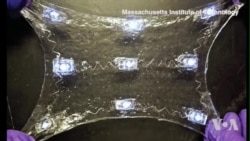Scientists say new made-made materials equipped with sensors could turn bandages into a valuable tool for health care workers.
Simple bandages are usually seen as the first line of attack in healing small to moderate wounds and burns. They are easy to use, covering up the damaged skin and giving it time to heal.
Scientists are now developing bandages with technology currently used in popular wearable devices, such as smart watches and fitness trackers. They have begun adding small sensors of all kinds to bandages and making them more sensitive.
Scientists are also making new materials called hydrogels. Hydrogels are similar to human skin.
Researchers at the Massachusetts Institute of Technology have found a way to combine these two technologies. They created a stretchy polymer with firmness similar to human soft tissue.
The new, combination product has titanium wires that lie in a zig-zag, or “z”- shaped, design. The wires, connected to electronic sensors, stretch easily without breaking contact with the sensors.
The MIT researchers also created strong links between the electronic sensors and the hydrogels.
Xuanhe Zhao is an associate professor of Mechanical Engineering. He said the researchers put electronic devices, such as sensors, into the new material. They used a different device to put medicine in the damaged skin.
The resulting product becomes a kind of “smart-wound dressing” – one that can react to changes in the skin around it.
For example, Zhao said, if there is a sudden increase in temperature, the wound will send out a command. That is when “the controlled drug delivery system can deliver a specific drug to that specific location.”
LED lights in the bandage could warn patients and doctors about changes in different areas. Medication quickly spreads across the bandage, through tiny passageways.
Researchers say the new material can be used both on the skin, and inside the body.
Zhao told VOA that he and his team are “working hard” and hope to get to clinical tests soon. But it will be some time before these “smart bandages” reach the hospital or drug stores.
Zhao said he “hopes eventually it (the bandage) will have a broad application.” In the future, such products might even contain a computer chip, which would give it more power to analyze what is needed.
I’m Anne Ball.
George Putic reported on this story for VOANews.com. Anne Ball adapted his report for Learning English. George Grow was the editor.
What do you think of the idea of “smart bandages?” We want to hear from you. Write to us in the Comments Section, and on our Facebook page.
________________________________________________________________
Words in This Story
sensor – n. a device that detects or senses heat, light, sound or motion, and reacts to it
polymer – n. a chemical product that is made of small molecules ordered in a simple repeating structure to form a larger molecule
titanium – n. a very strong and light silvery metal
analyze – v. to study something closely and carefully
delivery - n. the act of taking something to a person or a place
specific - adj. special; clearly and exactly presented





